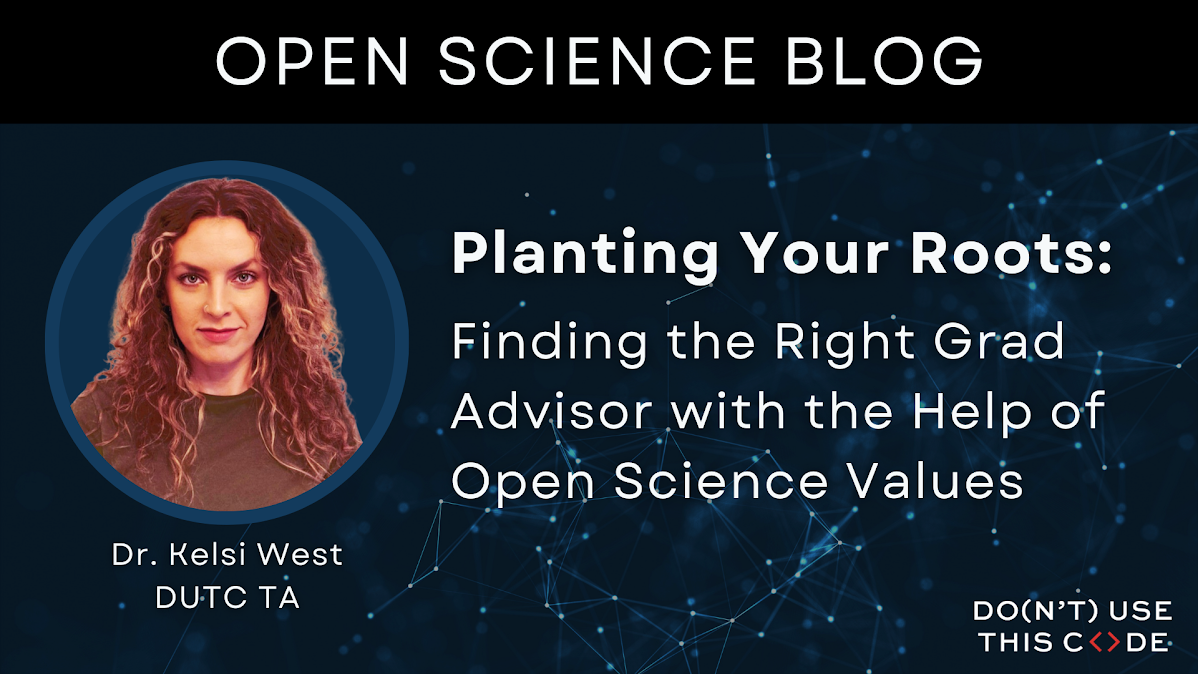Author: Kelsi O. West, PhD, MPH
Congratulations—you got into a graduate program! Now what? If you’re anything like most new graduate students, you’re probably overwhelmed by the flood of information. You are thrown into instantaneous berating of what’s important; funding, classes, research expectations, publications, seminars, teaching, endless new acronyms… Insert Imposter syndrome here.
Here’s the thing: one of the most important decisions you’ll make during your graduate degree is choosing your advisor (in some programs, this role may have a different title, such as a “research mentor” or “committee chair”). This isn’t just a "boss" for the next few years—this person’s research will shape your work, their mentoring style will influence your day-to-day experience, and their name will likely follow you on your first publications and way beyond into your career (especially if you stay in academia). Your advisor will likely be one of your key references for years to come, possibly influencing your opportunities long after you graduate. Think of it as becoming a branch on their academic “family tree.”
Do you want to be attached to a healthy, deeply-rooted oak or a sickly, fungus-ridden redwood?


Finding the right advisor can make or break your doctorate experience. While most advisors aim to support their students, some create environments where toxic behaviors become normalized. While not always the case, this is alarmingly common. But never fear, there are good faculty at every university! So, let’s talk about how to evaluate potential advisors and what you should focus on when making your decision.
Why Advisor Selection Is a Big Deal
Your advisor isn’t just a gatekeeper for your funding or someone to sign off on your dissertation. They’re a guide (hopefully), a mentor (ideally), and the person you’ll spend a significant chunk of your academic life working with. Their research will become your research, and their support—or lack of it—can determine whether you thrive or just survive.
Open science values like transparency, collaboration, and equity, are vital in a graduate program environment and many of these qualities overlap with what you find in a great advisor. Look for advisors who embody these principles in their mentoring style and research. These values often signal a positive and inclusive lab culture. Most doctoral programs are at least a three-year commitment, so you want to make sure you’re hitching your wagon to someone who aligns with your personality, goals, and needs. Don’t be afraid to ask these questions. This is as much about you as it is about them!
Key Questions to Ask Potential Advisors
When meeting potential advisors or learning about them, here are some questions to consider. The answers can help you figure out if their style and expectations are a good fit for you:
- How do you mentor students?
- Do they check in weekly, monthly, as needed, or not at all?
- Do they offer hands-on guidance, or do they expect you to figure things out independently?
- Do they encourage collaboration and knowledge-sharing among lab members?
- Do they foster a culture of transparency, where methods and data are openly discusse
- What’s your approach to work-life balance?
- Do they value boundaries and mental health, or do they live by the "PhD is your life" motto?
- Do they value time off? Do THEY take time off? Do they model these values themselves?
- What’s your vision for your lab in the next five years?
- Are they building a vibrant, collaborative team, or are they focused on specific, narrow goals?
- Are they building a collaborative team that embraces principles like open data, preprints, or reproducibility?
- What kind of independence do you expect from students?
- Do they expect you to hit the ground running with your own project, or will you get time to ramp up and learn?
- Who do I talk to when I need help?
- Do they have an open office policy?
- Do they frequently travel?
- Are they around often, or do they rely on post-docs or more experienced students to answer your questio
- How do you feel about side projects or collaborations?
- Are they open to you exploring interests outside their main research focus?
- Do they have group research meetings with other labs?
- How often do they collaborate with other groups on projects?
- How many publications do you think a student should have before graduating?
- This can give you an idea of their productivity expectations and the timeline they envision for you. Do they follow your graduate program’s guidelines, or do they have more requirements than expected?
- Are they open to publishing preprints or sharing negative results, aligning with open science principles?
- I would like to have ______ as my future career. How would you help me facilitate this goal?
- Do they have a track record of supporting students in other careers besides academia?
- Do they allow summer internships or teaching assistantships?
- Are they willing to connect you to people in their network to learn about other career options?
Don’t Skip Talking to Other Students
One of the best ways to get the inside scoop on a potential advisor is to talk to students in your program about faculty members. Students talk—a lot! Additionally, you can talk to current or former students in their lab (or their postdoc lab, if they’re a new Principle Investigator (PI)). They’ll give you a clearer picture of what it’s like to work with this person and how they handle mentoring.
Here are some specific questions to ask other students in your program:
- What does ____’s lab/department culture like—collaborative, competitive, or something else?
- Does ____ graduate students in a reasonable timeframe?
- Who would you recommend to be on my committee?
- What faculty have the best reputations with students?
Current or former students of the PI:
- What’s the advisor’s mentoring style?
- How often do they meet with lab/department members?
- Are they supportive when things don’t go as planned?
- How much independence do they give students? How much independence do they expect from students?
- Have they helped you with career planning or networking?
- Do they give feedback, and is it helpful and constructive?
Don’t be afraid to dig deeper—most students will appreciate your honesty and understand how important this decision is. I say this from experience!
During one of my rotations (how first year’s decide which lab they will join), I had a professor who seemed incredibly nice and genuinely interested in my work. Every conversation was positive, and when my rotation ended, he was super eager for me to join his lab, even asking me to commit on the spot.
I was flattered—it felt like a huge compliment! But I had two more rotations to finish, so I told him I needed time. Here’s the thing: I had talked to his students. They warned me he was two-faced—nice when things were going well, but if you ever got on his bad side, you’d stay there. Permanently. While part of me thought, “Maybe it would be different with me,” I decided to trust what his students said, and I didn’t join his lab.
A couple of years later, that professor was removed from my program’s faculty committee for bullying and harassing students—students who weren’t even in his lab.
Moral of the story? Listen to other trainees and students. If they’re telling you there’s a problem, believe them. Chances are, you’ll face the same challenges they did.
Established vs. New PIs
Not all advisors are created equal, and their career stage can make a big difference in your experience.
Established PIs:
- They likely have a well-funded lab and a clear track record of mentoring students. This provides stability and can make it easier to get fellowships funded and papers published.
- You can ask their former students or postdocs about their mentoring style and success stories.
- If they will not put you in contact with their previous students, use LinkedIn or other social media sites to reach out. But really, if they won’t provide their contact info, that’s a red flag.
- But be cautious—established “famous” advisors look great on paper, but may be barely around to mentor due to their responsibilities. You don’t get that reputation for sitting still too long! This means that you’ll have to be independent and rely on other lab members for mentoring. Take this into consideration when thinking about your support needs.
New PIs:
- They’re building their lab from scratch, so you might have more influence in shaping the lab culture and research projects.
- They may be super invested in your success since their early trainees are critical to establishing their reputation. This can come with added pressure or more hands-on interactions.
- On the flip side, they might still be figuring out how to mentor effectively, and funding could be less stable.
Specific Questions for New PIs
- How often do you meet with lab/department members?
- Can I talk to students from your postdoc lab/department?
- What’s your funding situation?
- What kind of projects are you planning to start?
Be Cautious About Contracts
During my time in graduate school, some advisors asked students to sign “contracts” before joining their lab. These agreements might outline expectations for work hours, project ownership, authorship, or even the number of publications required for graduation. While this might seem like a way to ensure clarity, if a professor relies on contracts to dictate every aspect of the advisor-student relationship, consider it a red flag. A healthy advisor-student relationship is built on mutual respect, not fear of repercussions.
Final Thoughts
A supportive and respectful environment matters just as much as the research itself—it’s what sets you up for success and keeps you sane. Sure, it makes sense to pick a lab based on the science, but as a curious scientist, you can probably find something exciting in a lot of different areas and steer your research in interesting directions once you’re there. What you can’t change, though, is a toxic mentor. Even the coolest science will feel unbearable in a toxic lab/department, so focus on finding a place where you can thrive, both personally and professionally.
Your advisor won’t magically transform into a different person after you join their lab, and it’s a mistake to think you’ll be able to change them. To avoid finding yourself in a toxic situation, do your homework upfront. Talk to current and former students, ask direct questions about the culture, and pay attention to red flags like favoritism, conflict avoidance, dismissive behavior, or a lack of clear communication. Pay attention to how they treat and talk to their current students—because in a couple of years, that will be you. Additionally, consider how their lab aligns with Open Science principles. Are they transparent about their research practices? Do they promote data sharing, collaboration, and reproducibility? A lab that embraces Open Science is more likely to foster a supportive and inclusive environment where your contributions are valued. If you need a lot of hands-on guidance and they’re never around, or if you want independence but they micromanage, it’s going to be a tough few years.
But here’s the good news: there’s an advisor out there for everyone! The key is finding someone whose mentoring style and lab/department vibe align with your goals and personality.
So take your time, ask every question you can think of, and choose wisely. Your future self will thank you!
Want to learn more about open science? Check out our website and register for the free NASA Open Science training)!
